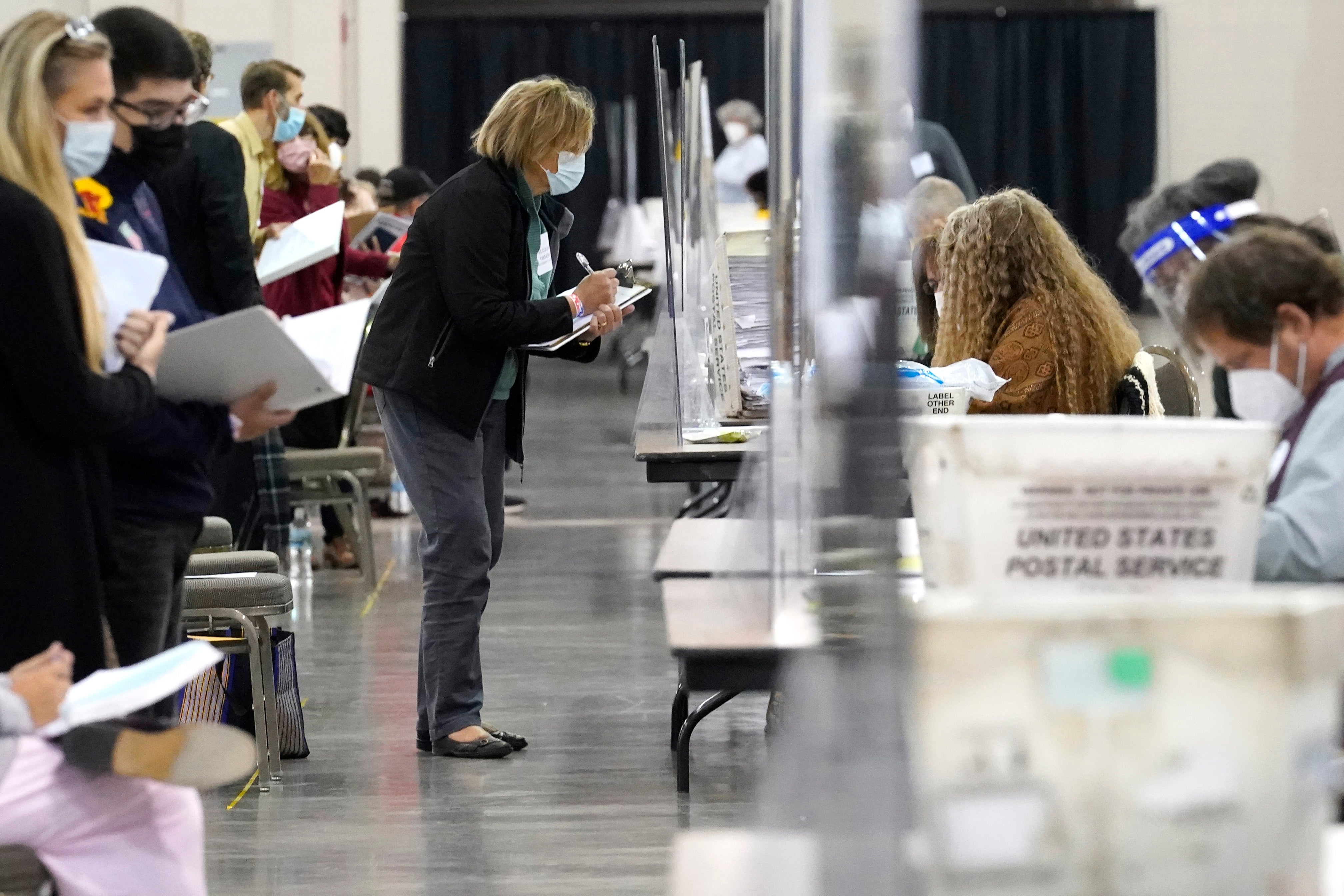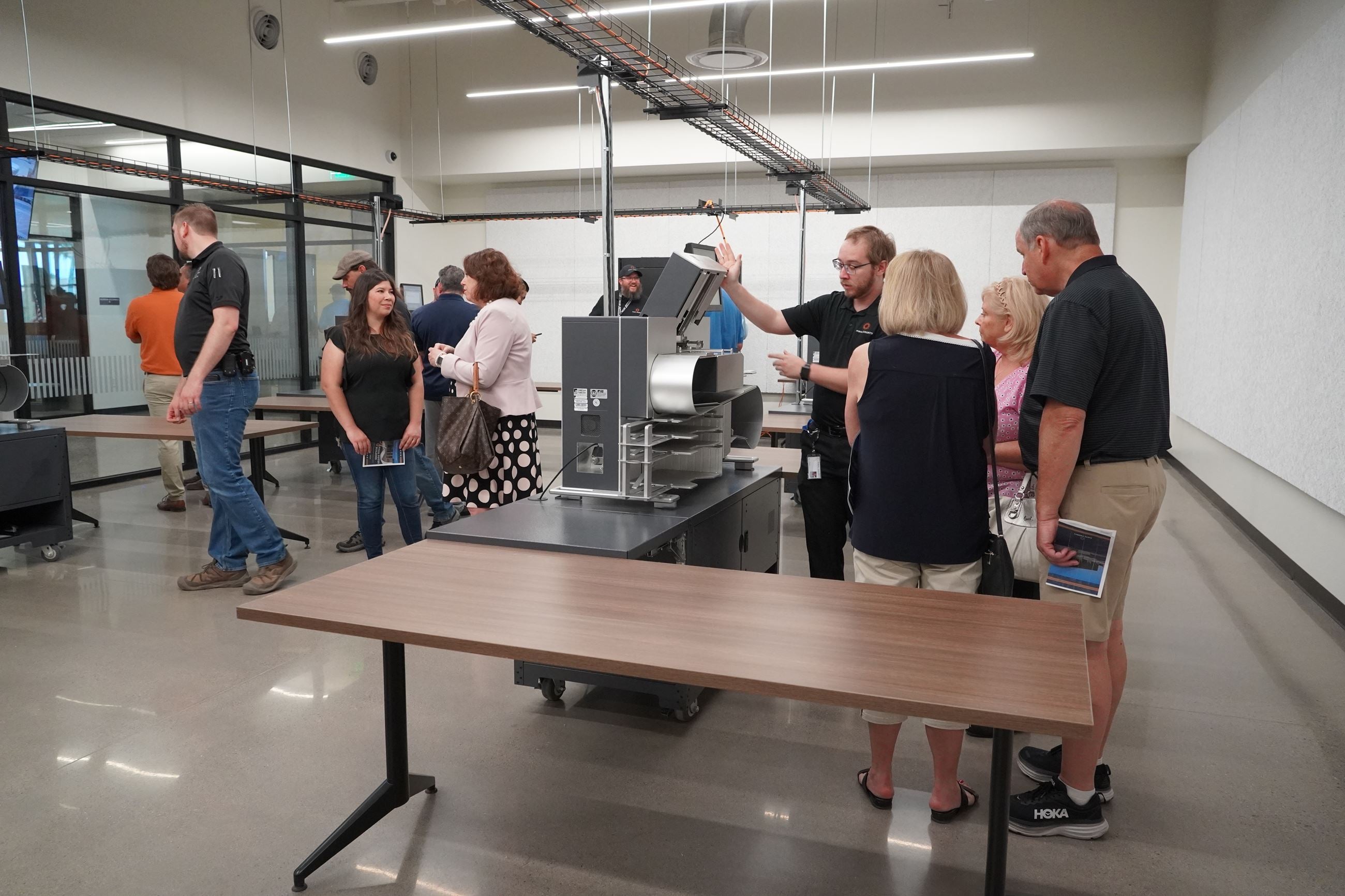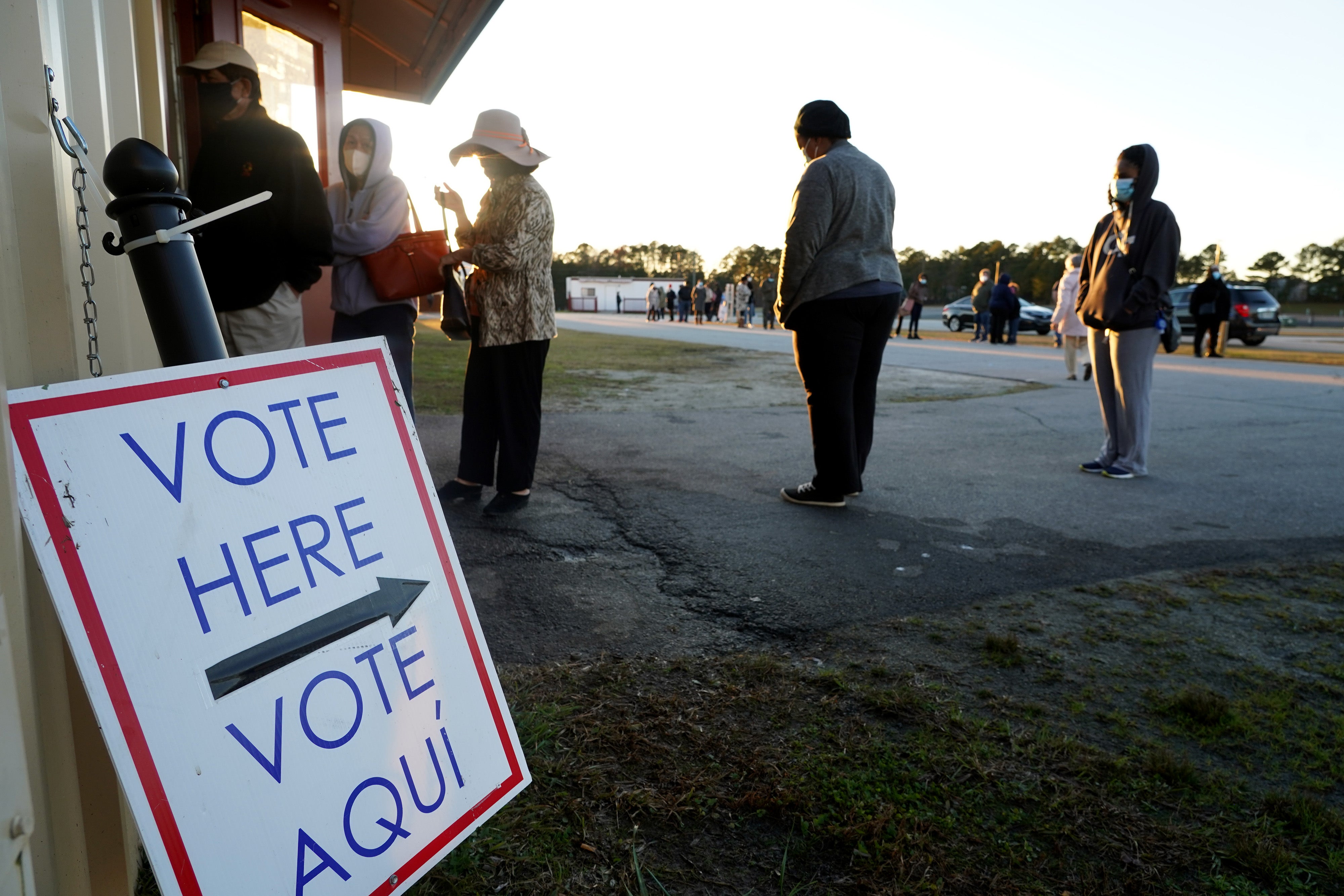Your support helps us tell the story
Learn moreClose
As your White House correspondent, I ask the tough questions and seek the answers that matter.
Your support allows me to be in the room and advocate for transparency and accountability. Without your contributions, we would not have the resources to challenge those in power.
Your donation allows us to continue this important work and keep you informed every step of the way to the November election
Andrew Feinberg
White House correspondent
Four years after Donald Trump and his followers repeatedly made baseless claims of voter fraud, counties across the country are ensuring that 2024 is not a repeat of 2020 by taking extreme measures to show that the U.S. election is not “rigged.”
His claims about how the 2020 election was “stolen” spread across social media, leading to unsubstantiated theories circulating that left much of the public with residual distrust of the vote-counting process. These fears have not abated since 2020, and Trump continues to promote the idea that the voting process in 2024 will be flawed.
Officials across the country are now trying to restore voter trust by promoting transparency. These measures include GPS trackers on machines, offering public tours, providing 24-hour video surveillance and voter education.
“The best way to instill trust in our election system is to make it as transparent as possible and to ensure that the public is involved in supporting that process,” Bobbie Gross, Colorado’s Mesa County clerk, told The Independent .
Colorado's pro-Trump district is working particularly hard to restore voter trust after one of the district's former officials, Tina Peters, was indicted in August on seven counts related to a security breach during the 2020 election.
The “secure rooms” that house the county’s voting equipment are now only accessible with ID, and even then, workers must enter in pairs “for accountability purposes,” Gross said. The county monitors these devices, including ballot drop boxes, with cameras around the clock to ensure security – even when elections are not taking place. If someone requests video footage, the county will provide it, Gross said.
 Recount observers observe ballots during a hand count of Milwaukee's presidential votes on November 20, 2020 at the Wisconsin Center in Milwaukee, Wisconsin. Counties across the country are rolling out new measures to promote transparency ahead of the 2024 presidential election (Copyright 2020 The Associated Press. All rights reserved.)
Recount observers observe ballots during a hand count of Milwaukee's presidential votes on November 20, 2020 at the Wisconsin Center in Milwaukee, Wisconsin. Counties across the country are rolling out new measures to promote transparency ahead of the 2024 presidential election (Copyright 2020 The Associated Press. All rights reserved.)
The county also hosts open houses, including one scheduled for Election Day, allowing the public to witness the process, inspect equipment and ask questions, Gross said. Providing public tours is important, he added, because “I think there's a lot of things the public doesn't know about, like how an election was conducted and what our controls are, so we're really trying to make sure we get that to the public.” make it accessible.”
Perhaps no county has been under as much scrutiny following the 2020 election as Maricopa County, Arizona. Trump won the district in 2016 but infamously lost it in 2020, making him the perfect scapegoat for his “rigged” election claims.
Maricopa County, where most Arizonans live, has become a crucial battleground that can help decide presidential elections.
The district also offers tours of its electoral area to the public. Before the nearly two-hour tour, individuals will be asked to complete a survey rating their trust in the electoral system on a scale of one to ten.
“We're asking you to bring your biggest election fears and your biggest election conspiracies, we'll address them all,” Taylor Kinnerup, communications director for the Maricopa County Recorder's Office, told The Independent. At the end of the tour, they repeat the survey, with each person typically giving a significantly higher rating.
If an in-person visit is not possible, Maricopa County also offers a “Transparency” tab on its website that provides a virtual tour of the facility.
In Pinal County, Arizona, a traditionally Trump-friendly county southeast of Phoenix, officials took the mission to be more transparent quite literally.
A wall of windows – the so-called “fishbowl” – gives viewers a 360-degree view of ballot counting and is part of a new $32 million voting center. The 53,000-square-foot center was built in just 16 months to be ready before the July primary election.
“When you know in your heart of hearts that there is nothing to hide, it is natural to speak openly about the process,” Pinal County reporter Dana Lewis told The Washington Post. “Even if you pull back the curtain, there are still people lurking in the shadows, but we will continue to try to use logic, accuracy and reason to combat the narrative of distrust in the electoral process.”
 In Pinal County, Arizona, a wall of windows – the so-called “fishbowl” – gives viewers a 360-degree view to conveniently watch the counting of ballots. (Pinal district)
In Pinal County, Arizona, a wall of windows – the so-called “fishbowl” – gives viewers a 360-degree view to conveniently watch the counting of ballots. (Pinal district)
In addition to allowing the public more access to their voting facilities, counties have taken steps that appear to put an end to the baseless voter fraud theories that Trump and his supporters have spread.
Trump has claimed that “mules” are dropping off hundreds of fraudulent ballots at mailboxes — now Pinal County and Maricopa County have installed video cameras to monitor the mailboxes.
Claims of a “suspicious bus” containing voting machines spread on social media. But Pinal County has placed GPS trackers on the cages used to transport voting machines, the Post reported. Because election officials know the routes they're supposed to travel, “if they suddenly stop moving, we know there's a problem,” Lewis told the outlet.
To demonstrate that its equipment is not connected to the Internet — and therefore cannot be hacked — the wires at the Maricopa County tabulation center are exposed. “We also have port blockers on all of our machines so someone can plug in a stray USB drive and either pull something out or put something in,” Kinnerup said.
Trump also made the debunked claim that people are “stuffing ballot boxes with fake ballots.” But printing fraudulent ballots that result in votes is simply not possible, Gross said. Each envelope is stamped with a signature that goes through a verification process, and each envelope also contains the person's voter ID card, giving the person “voter recognition.” At the end of the election, Gross said three components had to be right: “I have to have as much voter credit as the envelopes on the ballot papers.”
If a ballot is flagged as suspicious, the ballot will not be counted but will be forwarded to the district attorney for review.
“I wouldn’t tell anyone that there is no fraud in elections because we usually experience fraud in every election. Is it to the point where the outcome of an election would change? No, I haven’t seen it to this extent,” said Gross.
Mesa County, Arizona, is working on another project to increase trust. Voters could soon have the opportunity to count ballots by hand at home – digitally. Once all personal information is redacted, the image of the ballot can be posted online showing how it was marked and read.
 In 2020, people in Atlanta are lining up to vote. (AFP via Getty Images)
In 2020, people in Atlanta are lining up to vote. (AFP via Getty Images)
As counties seek to restore voter confidence in fair and secure elections, they have also increased measures to ensure the safety of poll workers.
“I think the more doubt is sown in the public mood, the greater the risk to the safety of those doing the work,” Kinnerup said.
Since the rhetoric during the 2020 election, threats against poll workers have increased. Four secretaries of state have received death threats since 2020, while a recent Brennan Center poll found that 38 percent of local election officials experienced threats, harassment or verbal abuse because of their work.
The threats were so severe that Cobb County, a swing county in Georgia, is considering adopting panic buttons. Mesa County will deploy security guards at its central counting facility on Election Day; Maricopa County has installed a “black iron fence” around the building, which requires ID to enter.
In 2023, envelopes containing fentanyl and other substances were mailed to election offices across the country. Now, Gross said Mesa County is offering personal protective equipment for those opening ballot envelopes.
Given these new measures, counties seem to be hoping they've debunked any conspiracy theories before they arise.
“In this election we will be more offensive than defensive,” Kinnerup said. “In 2020 we have never been faced with so many questions. We had never experienced so much, so much distrust. And I think now that we’ve spent the last four years preparing for that.”


Comments are closed.